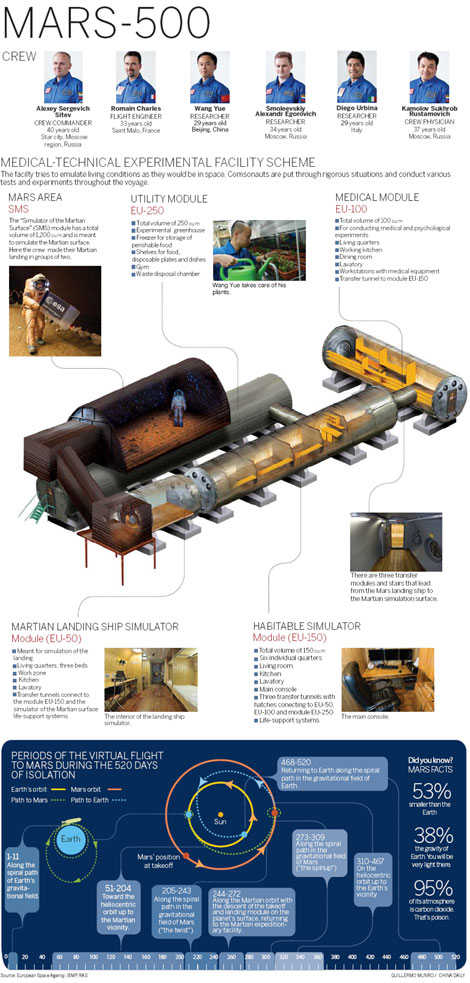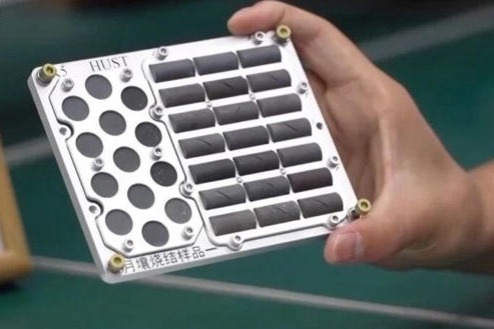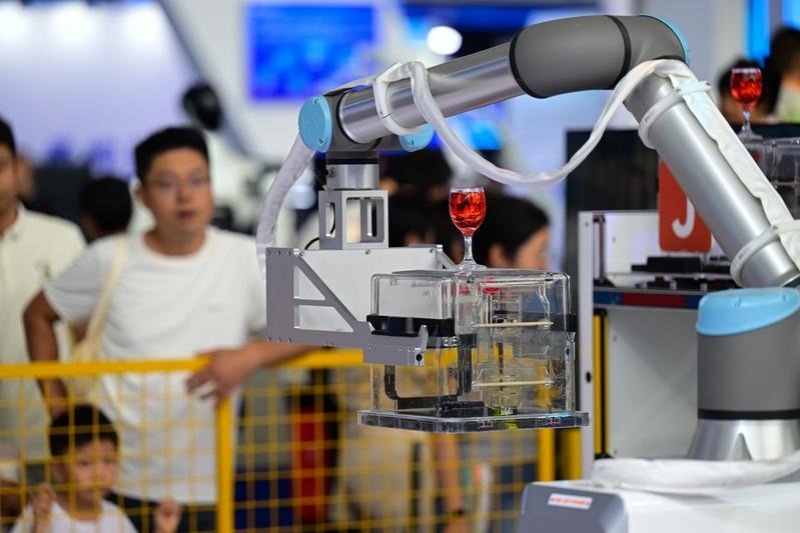Lost in simulated space


Related readings: Living in Limbo
China's Wang Yue was one of astronauts in the Mars-500 project to discover the effects of prolonged space flight on the body and mind. Wang Ru reports.
Wang Yue, who is still recovering from 520 days of isolation while simulating a manned space flight to Mars, was given an award to honor his achievement at the Astronaut Center of China (ACC) in Beijing on Monday.
The 29-year-old was one of six astronauts in the Mars-500 project, conducted by the Institute for Bio-Medical Problems (IBMP) at the Russian Academy of Sciences, in cooperation with The European Space Agency and ACC.
It has been more than two months since he left the simulated spaceship where he spent two birthdays, two Christmas Days and one Spring Festival.
"I would like to do the isolation experiment again but absolutely not right now," he says with a smile, while recalling the exciting and sometimes tortuous experience.
He was chosen as one of three astronauts to simulate a landing on Mars but had to routinely give urine and blood samples, perform experiments and deal with loneliness and depression.
In one of the experiments that almost drove Wang crazy, he had to gaze at a screen that displayed a circle of 16 round spots that surrounding a dot in the center. As one spot in the circle was randomly illuminated, Wang had to use his computer mouse to drag the center spot to the illuminated spot, as the cursor moved about randomly.
Inside the EU50 chamber, where he prepared for the landing on Mars, Wang wore a 35-kg spacesuit to sleep upside down to adjust to the gravity of Mars.
"I felt my blood rush to my head," he says.
The crew showered every 10 days, and Wang would often count down to the next shower. "It made me feel like time went faster," he says.
When the hatch was opened on Nov 4, 2011, the crew of six astronauts - three Russians, one French, one Italian and Wang, the only Chinese - stepped out of the spaceship.
During the 520 days of the experiment, they never left the ground but went through all the simulated experiences of a manned space journey to Mars and back, beginning from June 3, 2010.
"Can you believe we won't live together from now on?" Diego Urbina, the Italian engineer astronaut, said to Wang after being with him for 18 months in the windowless spaceship modules. Wang says the six of them became close friends.
"Now my friends are taking their holidays. Two of the Russians recently sent me an e-mail about fishing in the Black Sea," says Wang, who has just returned from his own holiday in Kunming, capital of Yunnan province.
Wang gained 5 kg in the past two months, half of what he lost during the 520 days of isolation. He also lost a lot of hair.
He still can't get used to the noise of everyday life and has sleeping problems. He is receiving help from psychological experts at the ACC.
"Inside the spaceship, I missed everything to do with the outside world, but as soon as the mission finished, I couldn't help but try to escape from normal life," says Wang, who has instructed astronauts working on environmental adaptability at ACC since 2008.
The IBMP complex in Moscow comprises an isolation facility, mission operations room, technical facilities and offices. It has conducted similar isolation studies in preparation for space flights since 2007.
The isolation facility consists of five different modules. Three of the modules - habitat, utility and medical - simulate the main spacecraft. The fourth simulates the Martian-lander ship and is connected to the main spacecraft.
The fifth module is a simulation of the Martian surface and is connected to the Martian-lander.
The combined volume of the modules is 550 cubic meters, which are maintained at Earth's normal barometric pressure.
Wang's private room was a 3-square-meter bedroom, where he hung a picture of Yang Liwei, China's first spaceman.
Once sealed in the "spaceship", the crew had voice contact with a simulated control center, family and friends, as per a standard space flight mission.
A 20-minute delay was built into communications with the control center to simulate an interplanetary mission and crew members had an almost identical diet to that of the International Space Station.
After 50 days of simulated space flight, radio signals were unstable due to simulated interference, such as solar winds.
To write and receive letters was one of the most important ways to release pressure. Wang wrote to his parents and girlfriend every week and sometimes complained to his girlfriend that she didn't write enough.
"In the isolated conditions, we had to learn to adjust our moods. I sometimes found myself suddenly becoming angry or depressed," Wang says.
The crew was allowed to take onboard personal items, such as books, films and laptops, and spent some of their free time exercising or studying.
Watching films and playing video games together were the main entertainments.
"Because we were often depressed, we tended to watch comedies and cartoons like Tom and Jerry," Wang says.
"Once, we watched the film Apollo 13 and were depressed for a few days after watching it."
The crew simulated all the elements of the proposed Mars mission - traveling to Mars, orbiting it, landing and returning to Earth.
They had to be self-reliant and were responsible for monitoring and maintaining their physical and mental health. In addition, they had to maintain systems, control resources, carry out standard and non-standard cleaning and perform standard investigations.
Simulated incidents also took place during their mission, such as a power failure. Alexey Sergevich Sitev, a senior diving specialist from Russia, the commander of the crew, led the astronauts in handling these problems.
"The long-term isolation and lack of communication (with the outside world) meant the crew had to be highly self-reliant," says Wu Bin, director of the astronaut training research institute under the ACC.
"The long-term disruption of their biorhythms affected the physical and psychological conditions of the astronauts, which was the main research target of this mission."
ACC director Chen Shanguang says, "Wang Yue and the other members of the Mars-500 project are our heroes. Their contributions to the future of manned space travel to Mars are crucial and significant."
Today's Top News
- Trade-in program likely to continue next year
- Li: SCO can play bigger role in governance
- Huangyan Island protection lifeline for coral ecosystem
- Latin America urgently needs green credit
- AI innovation powers China's lead in smart eyewear
- Takaichi's provocative remarks run afoul of law






























